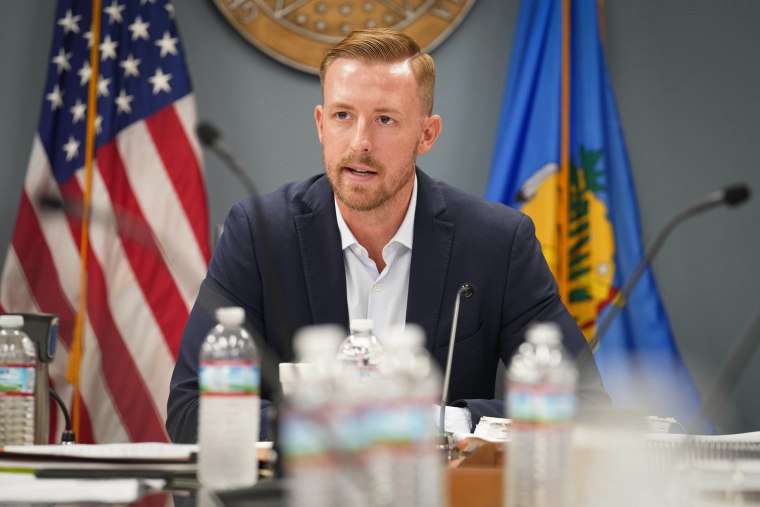Groups that combat sexual violence clash over how to handle Trump’s LGBTQ orders
For the National Sexual Violence Resource Center, the choice was impossible: erase mentions of transgender people from its website or risk the ire of the Trump administration, which has required that groups receiving federal funding end diversity, equity and inclusion programs and recognize only two sexes.
So the group reluctantly took down references to transgender people from its website, including mentions of services for transgender veterans and LGBTQ-focused book recommendations.
It did so just as the nation’s largest group fighting sexual violence, the Rape, Abuse & Incest National Network (RAINN), also pulled down pages referring to transgender people.
The backlash was swift. Local and national organizations that support women and sexual assault victims issued rare public criticisms of their allies, accusing them of abandoning trans victims, who face high rates of sexual violence, and urged other groups to “hold the line.”
The conflict exposed a sharp divide in the ecosystem of nonprofit groups that work to address sexual violence, many of which rely heavily on government funding to operate. Leaders of such groups say they feel pressured to choose between protecting grants they need to serve people in crisis and taking a stand for vulnerable members of their constituency.
“It’s thrown a lot of chaos into a sector that’s already — let’s face it — grossly underfunded,” said Emily Miles, executive director of the NYC Alliance Against Sexual Assault. “I can have empathy for difficult decisions organizations are having to make right now while also holding them to account for survivors who need their assistance.”
Shortly after the executive orders were signed, the Office of Management and Budget instructed the Justice Department, among other agencies, to review its programs for compliance. A spreadsheet provided by the OMB included roughly two dozen Justice Department programs that dole out more than half a billion dollars combined to combat sexual violence.
That, along with reports that the Trump administration is using keywords that include “sex,” “trauma” and “gender” to identify science grants to cut, worried many nonprofit groups.
White House deputy press secretary Harrison Fields did not address questions about how the groups were responding to the executive orders but reiterated the administration’s commitment to same-sex services for victims of sexual violence.

In recent weeks, the Justice Department’s Office on Violence Against Women has removed all grant applications and has not explained why. The department did not respond to a request for comment. “On the horizon, that’s the big question mark about what’s going to happen to those funding opportunities,” Miles said.
Yolanda Edrington, CEO of Respect Together, the umbrella organization of the National Sexual Violence Resource Center and the Pennsylvania Coalition to Advance Respect, said more than 90% of the National Sexual Violence Resource Center’s funding comes from state and federal government grants. Losing it could mean laying off staff members and not being able to provide services like legal counseling for victims.
But after it removed references to LGBTQ victims, the organization quickly reversed course, restored them and issued a public apology Feb. 20, calling it “a fear-based decision to the executive orders.”
In an interview, Edrington said the group was wrong to cave in to the administration so quickly. “We know exactly who we are and who we should represent, and we failed at that. I don’t want to mince words with that at all,” she said.
Edrington said she recently participated in a call with nearly two dozen other nonprofit anti-violence groups in which they discussed “which one of us can take the heat and be the loudest” while withstanding a potential loss of federal funding. They did not come to a decision.
Emily May, a co-founder and the president of Right To Be, a nonprofit anti-harassment organization, said her group relies on the federal government for at least 10% of its funding. It provides workplace culture training to several federal agencies and has already received word that two of them are unlikely to renew their contracts.
“Everybody is incredibly aware everything you say or do can put a target on your back, and that can be incredibly scary,” May said. “But the target is already on our back.”
Feeling that pressure, RAINN — which runs federally funded sexual assault hotlines, among other programs — removed its inclusion policy and pages expressing support for LGBTQ survivors. It also sent an email to everyone in its speakers bureau Feb. 7 saying it had unpublished victims’ stories, along with videos and social posts, in part to comply with federal guidance. The organization would be in touch with victims, it added, to see whether they “would like to update and republish” their stories.
Jennifer Simmons Kaleba, a RAINN spokeswoman, said federal agencies instructed the organization to change its website. She declined to offer specifics or identify which government offices advised it to remove LGBTQ-related content.
For Ethan Levine, an activist and member of RAINN’s speakers bureau, who is transgender, RAINN’s removal of the survivors’ stories was insulting. “I felt cast aside,” he said. He felt the group was asking him to update his story “to make it more palatable in this moment” and hoped that RAINN would follow the National Sexual Violence Resource Center’s lead and reverse its decision — or at least explain it further.
“If the biggest sexual assault organization in the U.S. is not willing to stand up, then what message does that send to smaller organizations?” he asked.
Simmons Kaleba said RAINN’s mission has not changed. “Any survivor can come to us as their authentic selves, and they’ll be safely received — so we do support every survivor of sexual assault,” she said. “That said, not everyone will support what we’ve had to do to continue our crisis services, and that’s a very reasonable reaction.”
On Feb. 20, as backlash mounted, the group sent an email saying that “RAINN stands with ALL survivors” and that it remains “steadfast in this mission,” urging supporters to sign a petition of support. It did not explain its decision to remove language from its site.
Sexual Violence Center, a Minnesota-based organization supporting rape victims, condemned RAINN in a statement last week and urged it to use its “considerable influence” to push back. The post was shared by Christian Nunes, president of the National Organization for Women, who warned the groups not to become “complicit” with the administration.
For Miles, of the NYC Alliance, RAINN’s decision to quickly comply with the Trump administration’s guidance put pressure on smaller groups to follow suit.
“Now is the time we have to show a little bravery, and we need to be banding together,” Miles said. “That’s the only way we are going to sustain this.”



